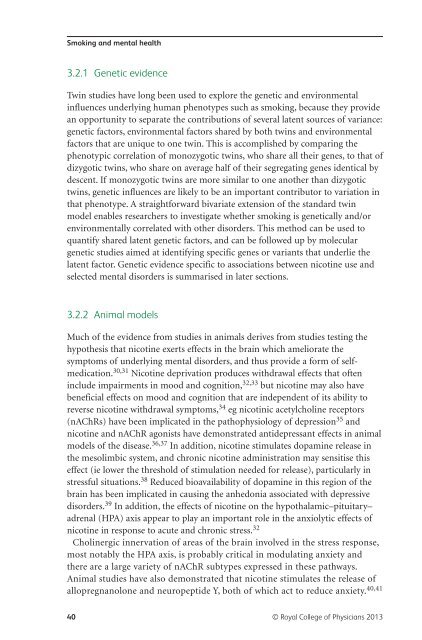Smoking and mental health - NCSCT
Smoking and mental health - NCSCT
Smoking and mental health - NCSCT
Create successful ePaper yourself
Turn your PDF publications into a flip-book with our unique Google optimized e-Paper software.
<strong>Smoking</strong> <strong>and</strong> <strong>mental</strong> <strong>health</strong><br />
3.2.1 Genetic evidence<br />
Twin studies have long been used to explore the genetic <strong>and</strong> environ<strong>mental</strong><br />
influences underlying human phenotypes such as smoking, because they provide<br />
an opportunity to separate the contributions of several latent sources of variance:<br />
genetic factors, environ<strong>mental</strong> factors shared by both twins <strong>and</strong> environ<strong>mental</strong><br />
factors that are unique to one twin. This is accomplished by comparing the<br />
phenotypic correlation of monozygotic twins, who share all their genes, to that of<br />
dizygotic twins, who share on average half of their segregating genes identical by<br />
descent. If monozygotic twins are more similar to one another than dizygotic<br />
twins, genetic influences are likely to be an important contributor to variation in<br />
that phenotype. A straightforward bivariate extension of the st<strong>and</strong>ard twin<br />
model enables researchers to investigate whether smoking is genetically <strong>and</strong>/or<br />
environ<strong>mental</strong>ly correlated with other disorders. This method can be used to<br />
quantify shared latent genetic factors, <strong>and</strong> can be followed up by molecular<br />
genetic studies aimed at identifying specific genes or variants that underlie the<br />
latent factor. Genetic evidence specific to associations between nicotine use <strong>and</strong><br />
selected <strong>mental</strong> disorders is summarised in later sections.<br />
3.2.2 Animal models<br />
Much of the evidence from studies in animals derives from studies testing the<br />
hypothesis that nicotine exerts effects in the brain which ameliorate the<br />
symptoms of underlying <strong>mental</strong> disorders, <strong>and</strong> thus provide a form of selfmedication.<br />
30,31 Nicotine deprivation produces withdrawal effects that often<br />
include impairments in mood <strong>and</strong> cognition, 32,33 but nicotine may also have<br />
beneficial effects on mood <strong>and</strong> cognition that are independent of its ability to<br />
reverse nicotine withdrawal symptoms, 34 eg nicotinic acetylcholine receptors<br />
(nAChRs) have been implicated in the pathophysiology of depression 35 <strong>and</strong><br />
nicotine <strong>and</strong> nAChR agonists have demonstrated antidepressant effects in animal<br />
models of the disease. 36,37 In addition, nicotine stimulates dopamine release in<br />
the mesolimbic system, <strong>and</strong> chronic nicotine administration may sensitise this<br />
effect (ie lower the threshold of stimulation needed for release), particularly in<br />
stressful situations. 38 Reduced bioavailability of dopamine in this region of the<br />
brain has been implicated in causing the anhedonia associated with depressive<br />
disorders. 39 In addition, the effects of nicotine on the hypothalamic–pituitary–<br />
adrenal (HPA) axis appear to play an important role in the anxiolytic effects of<br />
nicotine in response to acute <strong>and</strong> chronic stress. 32<br />
Cholinergic innervation of areas of the brain involved in the stress response,<br />
most notably the HPA axis, is probably critical in modulating anxiety <strong>and</strong><br />
there are a large variety of nAChR subtypes expressed in these pathways.<br />
Animal studies have also demonstrated that nicotine stimulates the release of<br />
allopregnanolone <strong>and</strong> neuropeptide Y, both of which act to reduce anxiety. 40,41<br />
40 © Royal College of Physicians 2013














